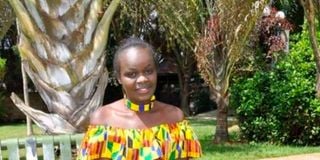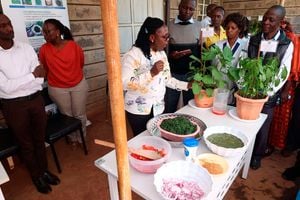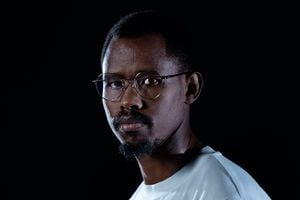
Ask any recent graduate, and they'll tell you about the heartbreak of emails starting with “We regret to inform you…” For many graduates, job hunting is a full-time job, one filled with hope, frustration, and unnerving silence. But hundreds of applications later, most are left wondering: Is it the universities, the job market, or just bad luck? Nation Lifestyle spoke to four graduates with degrees in mathematics and physics about the reality of job searching.

A journey through numbers and hope
Isaac Owuor Ombedho, a 25-year-old University of Nairobi alumnus, had always loved mathematics.
“In primary and high school, it was my best subject,” he says. That interest led him to pursue a Bachelor of Science degree in mathematics and physics. Even though he wasn’t aiming at a specific job at the time, he knew he was good at science.
Isaac graduated with a second-class upper degree in September 2024. Just like most students, he had high hopes. He believed that with his degree, he would get a job quickly. But the reality is different.
Isaac dreamed of working in data analysis and applied to many jobs, some local, some international. While a few gave feedback, others never responded. One international NGO even shortlisted him for a data analyst position in March, but he never heard from them after that. “I’ve submitted several applications. Even now, one is still pending.”
He targeted institutions like Kenya Biostatistics, KenGen, and banks. Despite that, it was difficult to secure a fixed job. Isaac volunteered extensively to gain experience. He volunteered with a community-based organisation called Amani Kibera in October 2020 focused on peace-building, education, and sport. He helped in organising mentorship programmes for adolescent girls amidst the Covid-19 pandemic when teenage pregnancies were increasing.
“We started with less than 10 girls, but we had more. We were given food by donors, and we had a professional module for mentorship,” he explained. Isaac also coordinated activities such as community clean-ups and tree planting. These assisted him in developing leadership skills and direction.
Amani Kibera had supported Isaac's university education, so repaying in terms of volunteering was second nature. He went on to become a senior project manager for their sports in development programme, which uses sport to deliver life skills like football and basketball.
Although not a high-paying job, the work sustained Isaac. His current project (Sports for Peace and Development), which started in May 2024, will be completed in November, and he intends to complete it before looking for other opportunities.
After graduation, Isaac really struggled. His parents moved back to the village, and although his brother took care of him like a father, Isaac couldn't move in with him since he had started his own family. He worked for two months in a school tuck shop after graduation, but then it shut down. He searched day and night for a job, coming home mostly empty-handed.
Luckily, one of his classmates stepped in to assist him for two months at his worst moment. “He paid everything, gave me shelter.” It was under this condition that Amani Kibera offered him a contract as a mentor.
Isaac believes that his university studies prepared him adequately, especially in IT. “There are many graduates who understand mathematics, but know little about IT. Education helped me learn how to get around in the job market.”
Isaac hopes to pursue a Master’s degree in analytics, preferably abroad. “I’m now trying to get a passport.” He has also taken short courses in project management, customer relationship management, and data science.
Isaac is open to exploring careers beyond mathematics and physics. “If there is a gap in my field, I’ll explore it, but I’ve learned to be flexible and fit into other fields,” he says.
Engineering dream turns into a reality of teaching
Like Isaac, Mercy Mukiri Gitonga followed her love for mathematics. Unlike Isaac, though, Mercy's path was influenced by limited knowledge of career options. Despite dreaming of being an engineer, she was advised to become a teacher, which was deemed a “safer” option.

Mercy is a 24-year-old intern teacher in Kilifi County. She teaches mathematics and physics in a junior secondary school. But getting here was not easy.
Mercy graduated with a Bachelor of Education (Science) from Kenyatta University in 2022 with mathematics and physics as her specialist subjects. “I joined Kenyatta University in 2018 and graduated with a second-class upper division,” she says.
She had hoped to be an engineer, but during her final year of secondary school, she was counseled by her physics teacher. “He told me to consider teaching. He said the education sector wasn't as crowded as engineering, and I could get a job faster.”
She accepted teaching as her destiny. “I am satisfied and contented. It is always a pleasure to share my mathematics expertise with others,” she explains.
But becoming a member of the teaching fraternity was not as simple as she had imagined. “I had very high expectations of being quickly absorbed by the government. But upon graduation, I realised that the market was filled with mathematics teachers.” It took almost two years before she was officially hired as an intern teacher in early 2024.
She had applied to both government and private institutions and worked in two schools before she got her current job. She also applied outside teaching.
“Last year there was an accounting job opening at Safaricom and then another one at TSC this year, requiring human resources officers. I applied for the two, but I wasn’t successful,” she reveals.
To improve her chances, Mercy considered volunteering. “I had the idea of interning at an international school. They sometimes employ assistant teachers to help with different curricula. I wanted to learn and gain experience, but I didn't get the chance.
“I thought I could work in NGOs and banks as an accountant, or as a school bursar.” She even thought of going into tech.
The biggest challenge for Mercy after she graduated was the unforgiving job market. “We are many graduates competing for very few jobs. Whether in the public or private sector, it's tough,” she said. “You have to be patient and expect anything.”
Mercy also thinks that her university did not prepare her well enough for the real job. “When I graduated in 2022, that's when the competence based curriculum started. I had prepared to teach at high school level, but I was posted to junior secondary, which is very different. The mathematics we studied at university was advanced, and we were trained to teach teenagers. But now, I'm teaching much younger children.”
Still, she has big dreams for the future. “I would like to pursue a Master's degree and be a maths lecturer. I'm also open to teaching abroad or studying abroad,” she says.
So, what keeps her going? “I remind myself why I started. I enjoy seeing the impact I have on learners. It's not strictly about teaching maths. It's about helping them think differently and applying the knowledge in their own lives. Even when I had no job, I was inspired because I knew I could make a difference.”

A physicist’s path through uncertainty and hope
Fred Mokua is a youth advocate and a 26-year-old physics graduate. He studied Applied Optics and Lasers, which is a branch of physics that touches on light and ionising radiation. “I joined the university in 2018 and graduated in 2022 from Multimedia University of Kenya.” His course fell under the Department of Physics and touched on applications of radiation in industry, medicine, and telecommunication.
Fred developed an interest in science early in life. “I was raised by my uncles, and they would tell me that physics is tough, so I wanted to understand why.” Guided by an inspiring primary science teacher, Fred focused on science subjects more and chose to major in physics.
He was a straight-A student and did well in university, earning a Max Planck Institute scholarship in Germany, where he is presently pursuing a Master's degree in laser technology.
But his post-graduation life was not a cakewalk. “I sent out over 100 job applications in 2023. My two mailboxes were stuffed with rejection letters. More responses than started with, 'We regret to inform you…’“He applied for medical jobs, education jobs, research jobs, and telecom jobs, but failed each time.
He worked briefly at a fiber optics company but left after a month. “The safety standards were poor. I couldn’t work like that.”
After that, Fred turned to leadership and youth advocacy, which had always been his passion. In university, he was involved in student leadership and continued to work with youth groups after graduation. “I served in Congress between 2019 and 2022 at Multimedia University and as secretary general to the alumni of the university and college students Peace Association between 2021 and 2022, then later on joined the EAC youth parliament as a youth ambassador in 2024 to date,” he adds.
Later, he ventured into consultancy in radiation safety. He works in both the health and industrial sectors now, ensuring that machines like X-rays and CT scans are safe to use. He conducts quality assurance patrols in hospitals and industries.
Fred says his biggest challenge was the lack of support after graduation. “There’s a gap between school and the real world. You graduate and realise you still don’t have the skills needed in the job market. Most people in the industry are old and don’t want to mentor young professionals. They see us as competition.”
Fred believes his university gave him strong theoretical knowledge but not enough practical training. Still, he doesn’t regret choosing physics. “Physics runs in my blood. Everything around us is physics,” he said proudly.
While the majority of his earnings today are derived from freelance work and leadership positions, less than 20 per cent of it is attributable to what he studied. “I had to devise other means to survive,” he told Nation Lifestyle.
Fred plans to pursue further education and conduct more research. “I wish to apply my knowledge to provide solutions to society, be it in health, telecommunication, or science,” he says.

Rethinking the math-education equation
Sheila Moraa Omwenga offers a different twist, one that many graduates in Kenya can relate to. Just like Mercy, she was advised to take education because it was “marketable.” But five years later, she’s rethinking everything, including a shift into data analytics.
Sheila is 27 years old and works at Colomar East Africa as a sales and marketing manager. She studied mathematics and business at Moi University in Eldoret, but her education journey didn’t pan out the way she had hoped.
“I wanted to do something related to accounting. But my parents advised me to take education because it was more marketable.”
Though it wasn’t her first choice, Sheila grew to love teaching. She graduated in 2020 with a second-class upper degree.
After graduation, Sheila expected to get a job quickly. “It has been almost five years now. The job market changed due to the new CBC curriculum, which shifted many teaching roles. We thought we would teach in secondary schools, but now we must start with junior secondary before being posted to upper levels.”
Sheila took a professional accounting course a few years ago. “I studied CPA up to Section Five from 2018 to 2021, and I also worked at a Pharmacy as an accountant from 2022 to 2024. I resigned due to poor working conditions and late working hours.”
Now, Sheila is thinking ahead. “I’ve considered going into data analysis, which combines maths and IT. The world is changing. Most companies now need people with data skills to help them make decisions. It’s a growing field and not yet flooded.”
Although she isn’t enrolled yet, she plans to start her Master’s programme next year, focusing on data analysis.
“We all had big expectations to finish school and get a job. But things didn’t go that way. The curriculum changes forced us to teach in areas we weren’t trained. And the pay? It starts at shs17,000 for an internship, which lasts up to two years before getting a permanent job.”
Location also matters. “In Nairobi, the competition is too high. Most vacancies are in rural areas. It takes longer to get a job in the city.”
She also feels that her university did not prepare them well for these realities. “If we had been told that we would be teaching in junior schools when we started, we would have prepared accordingly. Now, many are quitting the profession and going for other jobs.”
Still, Sheila is aware that her skills in mathematics and business give her options. “I was advised that this combination can take me into many areas, business, banking, management, even finance. You just need to add a short course.”
She wishes that someone had told her that sometimes the goal is not always to get a degree, but a secure job. “Passion is great, but so is money and survival,” she says.
Sheila is driven by one thing only – the hope to learn and earn more. “My incentive is money. The more money offered, the more I'll do. If you get stuck in your current profession, don’t be afraid to make a switch. Research and know what you want. It is never too late to start over.”





